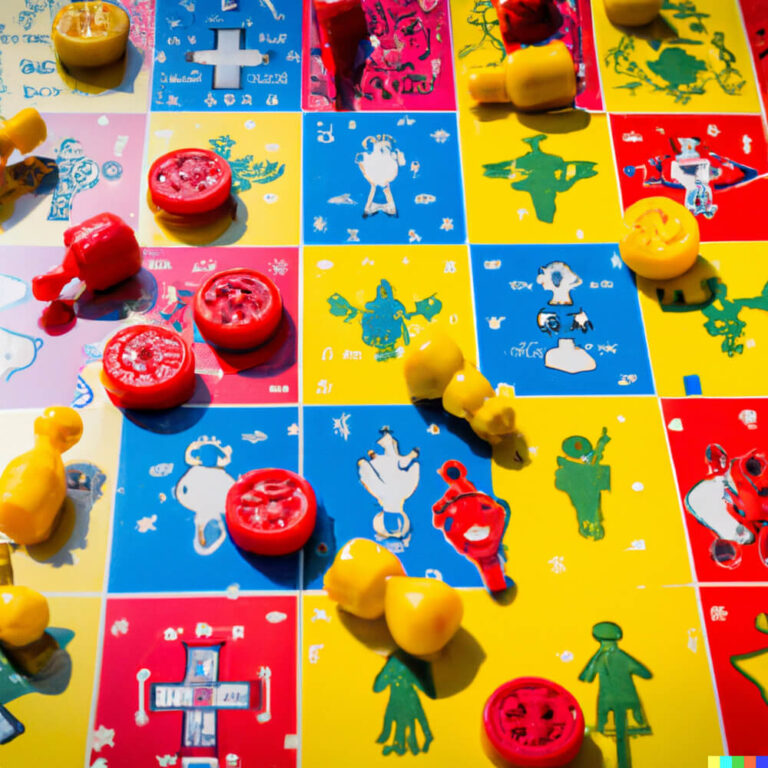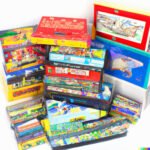Classic board games have a special place in the hearts of both children and adults alike. Despite the rise of digital entertainment, these timeless classics continue to captivate young minds with their engaging gameplay and endless fun. In this article, we will explore the best classic board games for kids, highlighting their enduring popularity and the benefits they offer for child development and social interaction.
There is something extraordinary about gathering around a table with friends or family and engaging in a friendly battle of wits over a board game. Classic board games have withstood the test of time because they provide a unique combination of entertainment and educational value. From fostering strategic thinking to enhancing vocabulary skills, these games offer more than just passing moments of amusement.
Playing board games can contribute significantly to a child’s cognitive, social, and emotional development. They encourage critical thinking, problem-solving abilities, and logical reasoning. Moreover, they promote social interaction, communication skills, patience, and teamwork. Whether it’s negotiating deals in Monopoly or unraveling mysteries in Clue, classic board games create opportunities for learning while having a blast.
In the following sections, we will delve into specific examples of beloved classic board games for kids that have stood the test of time. We will also discuss strategies for introducing these games to children who are accustomed to digital entertainment. Additionally, we’ll explore how classic board games can be adapted to appeal to modern generations while still preserving their original charm.
The world of classic board games is boundless and offers countless possibilities for enriching family game nights or educational activities. Let’s embark on this nostalgic journey together as we discover why these traditional favorites continue to bring joy to children’s lives today.
The Classics
Classic board games have stood the test of time and continue to provide hours of entertainment and fun for children of all ages. These traditional games not only capture the imagination of kids but also offer a range of benefits for their development and social interaction skills. Here is a closer look at some of the best classic board games for kids:
- Monopoly: This ultimate money management and strategy game has been captivating children for generations. Players buy, sell, and trade properties, aiming to accumulate wealth and bankrupt their opponents. Monopoly challenges kids to think strategically, make decisions based on risk and reward, and practice basic math skills.
- Scrabble: Boosting vocabulary and word skills through fun gameplay, Scrabble is a favorite among young learners. Players create words using their letter tiles on a crossword-style grid, earning points based on the difficulty of the word played. This classic game promotes literacy skills, strengthens spelling abilities, and encourages strategic thinking.
- Clue: Unleashing the detective skills in young minds, Clue takes players on an exciting mystery-solving adventure. Each player tries to determine the murderer, weapon used, and location of a crime by gathering clues through deductive reasoning. Clue develops critical thinking abilities, logical reasoning, problem-solving skills, and enhances memory retention.
- Chess: Known as one of the oldest strategic board games in existence, chess offers numerous benefits for child development. Playing chess improves analytical thinking, problem-solving abilities, foresight planning, pattern recognition skills, concentration levels, and patience. It also fosters creativity as players strategize different approaches to outmaneuver their opponent.
- Candy Land: Designed specifically for younger children with its colorful and magical world, Candy Land is an enchanting adventure through a candy-themed landscape. This simple counting game helps preschoolers learn colors, numbers recognition/startegy decision-making in a cheerful environment.
- 6.Checkers: A classic game that promotes logical reasoning and critical thinking, checkers is a perfect introduction to strategy games. Players aim to outmaneuver their opponents by capturing their pieces or blocking their moves. Checkers develops critical thinking skills, pattern recognition, problem-solving abilities, and spatial awareness.
These classic board games provide entertainment while also supporting various cognitive skills and social interactions in children. Whether it’s the creative thinking required in chess or the vocabulary-building opportunities in Scrabble, these traditional games have much to offer young minds.
Make Way for the Classics
As technology continues to advance, it can sometimes be challenging to introduce new generations to the joys of classic board games. However, these timeless favorites offer a unique and valuable experience that cannot be replicated in the digital world. Here are some strategies to make board games appealing and exciting for kids:
- Create a Fun Atmosphere: Set the stage for an enjoyable board game experience by creating a fun atmosphere. Use colorful game boards and accessories, play background music, or even dress up as characters from the game. This will engage children’s imagination and make the experience more immersive.
- Choose Age-Appropriate Games: Select board games that are suitable for your child’s age and interests. Young children may prefer games with simple rules and colorful designs like Candy Land or Checkers, while older children might enjoy more complex strategy games like Chess or Monopoly.
- Add a Competitive Element: Children often thrive on competition, so adding a competitive element can make board games more exciting for them. You can set up tournaments or keep score throughout multiple rounds to increase their engagement.
- Show Enthusiasm: Kids are more likely to show interest in something if they see their parents or older siblings enjoying it. Demonstrate enthusiasm and showcase your own enjoyment while playing board games together.
Incorporating classic board games into family game nights is also an excellent way to bond with your children while spending quality time together. Here are some tips on how to make the most out of family game nights:
- Rotate Game Selection: To keep things fresh and exciting, rotate the selection of games played during family game nights. Let each family member have a turn choosing which game to play, ensuring everyone gets a chance to enjoy their favorites.
- Designate Game Night: Establish a specific day and time for family game nights to make it part of your routine. Consistency will build anticipation and create a special tradition that children can look forward to each week or month.
- Create Special Snacks or Treats: Enhance the festive mood by preparing special snacks or treats for family game nights. This can be as simple as popcorn, finger foods, or themed treats that tie in with the game being played.
- Encourage Sportsmanship: Teach your children the importance of good sportsmanship during board games. Emphasize fairness, honesty, and respecting others’ moves or decisions. These values will not only make family game nights more enjoyable but also carry over into other aspects of their lives.
By incorporating these strategies and making board games an integral part of your family’s entertainment repertoire, you can ensure that new generations continue to appreciate and enjoy the timeless appeal of classic board games for years to come.
Choosing the Perfect Classic Board Game for Your Child’s Age and Interests
When it comes to selecting a classic board game for your child, it’s important to consider their age and interests. Different games are designed to cater to various age groups and offer unique challenges and learning opportunities. By choosing the perfect board game, you can ensure that your child will have an enjoyable and beneficial experience.
For preschoolers, simple and interactive games such as Candy Land or Checkers are ideal choices. These games promote visual recognition, basic counting skills, and turn-taking, helping children develop their cognitive abilities while having fun. Additionally, colorful boards and vibrant characters engage young children’s imagination and provide a visually appealing experience.
Elementary school kids can benefit from more complex games like Scrabble or Clue. Scrabble helps with vocabulary development, spelling skills, and strategic thinking. On the other hand, Clue encourages deductive reasoning and logical problem-solving as players work to solve a mystery. These games not only entertain but also foster critical thinking skills that are crucial for academic success.
Teenagers can enjoy more challenging games such as Monopoly or Chess. Monopoly teaches financial literacy by introducing concepts like money management, decision-making, negotiation skills, and risk assessment. Meanwhile, Chess enhances strategic thinking, concentration abilities, memory retention, patience, and foresight – making it an excellent choice for developing valuable life skills.
To ensure the best fit for your child’s interests, consider their hobbies or subjects they enjoy in school. There are many educational board games available that cater to specific interests such as science or history. Choosing a game related to their passion can make learning more enjoyable while still providing the benefits of social interaction and cognitive development.
In summary, selecting the perfect classic board game for your child involves considering their age group along with their interests and preferences. By doing so, you can enhance their learning experience while providing them with hours of entertainment. Whether it’s a game of strategy like Chess or a colorful adventure in Candy Land, the right board game can offer endless opportunities for fun and growth.
The Educational Value of Classic Board Games for Kids
Classic board games have long been a staple in children’s playrooms and family game nights. But beyond their entertainment value, these games also offer numerous educational benefits for kids of all ages. From developing cognitive skills to enhancing vocabulary and problem-solving abilities, classic board games provide a fun and interactive way for children to learn and grow.
Enhancing problem-solving and strategic thinking with Chess
Chess is renowned for its ability to foster strategic thinking and problem-solving abilities in players. This classic board game requires players to analyze different moves, predict their opponent’s moves, and think several steps ahead. Through playing chess, children become adept at evaluating different scenarios, weighing the pros and cons of each move, and making informed decisions – skills that are valuable not just in the game but also in various real-life situations.
Building vocabulary and language skills with Scrabble
Scrabble is a beloved classic board game that not only challenges players’ vocabulary but also enhances their language skills. From forming words using letter tiles to strategically placing them on the board for maximum points, Scrabble encourages children to expand their vocabulary, improve spelling proficiency, and refine word recognition abilities. Additionally, this game promotes critical thinking as players must consider multiple options before settling on the best word choice.
Developing math skills and decision-making with Monopoly
Monopoly is more than just a game about buying properties and amassing wealth; it is also an exceptional tool for teaching important math concepts to kids. By handling money while buying properties, paying rent, collecting rent from opponents, and making decisions about investments, children improve their counting skills, practice money management, develop rudimentary economic understanding such as budgeting or making trade-offs.
Stimulating deductive reasoning with Clue
Clue provides an exciting platform for young detectives-in-training to sharpen their deductive reasoning skills. As players move around the board, collect clues, and eliminate possibilities, they are required to draw logical conclusions and use deductive reasoning to solve the mystery. This classic game challenges children’s analytical thinking, enhances their memory, and teaches them how to make connections between different pieces of information.
Developing spatial awareness and pattern recognition with Candy Land
Candy Land is a colorful and magical adventure that offers younger children an introduction to board games while developing their spatial awareness and pattern recognition skills. As players navigate through a whimsical candy-themed world, they learn to recognize patterns such as colors or shapes on the game cards. Furthermore, Candy Land encourages turn-taking, patience, and following rules – essential social skills for young children.
Classic board games have stood the test of time because they offer more than just entertainment. They provide a myriad of educational benefits that promote cognitive development, language skills, critical thinking abilities, and social interaction in children. By incorporating these games into playtime and family gatherings, parents can watch their children grow academically and socially while creating cherished memories that will last a lifetime.
A Twist on Classics
The world of board games has evolved over time, and classic games have not been left behind. Modern variations and adaptations of these beloved classics bring a fresh twist to the traditional gameplay, making them even more appealing to kids in today’s digital age. These modern versions introduce exciting twists and updated themes that add excitement and novelty to the original concepts.
One example of a modern variation is “Monopoly: Fortnite Edition.” This adaptation combines the classic money management and strategy gameplay of Monopoly with the popular Fortnite video game. Players can choose their favorite Fortnite character as they buy, sell, and trade locations, aiming to be the last player standing. With different objectives and unique power-up abilities inspired by the video game, this version adds an extra layer of excitement for young gamers.
Another modern twist on a classic is “Scrabble Junior.” Designed specifically for younger children who are just starting to learn how to read and spell, Scrabble Junior features two different levels of play. The beginner level includes preprinted words on the board, while the advanced level allows players to create their own words. By incorporating pictures into the gameplay, this adaptation not only introduces basic spelling skills but also enhances vocabulary development in a fun and engaging way.
| Game | Variation/Adaptation |
|---|---|
| Monopoly | Monopoly: Fortnite Edition |
| Scrabble | Scrabble Junior with beginner and advanced levels |
Additionally, technology has paved the way for classic board games to make their presence felt in digital forms. Many classic board game apps and online versions are available for tech-savvy kids who enjoy playing games on tablets, smartphones, or computers. These digital adaptations offer the convenience of playing anytime, anywhere, and often include interactive features, such as animated characters or sound effects, that enhance the overall gaming experience.
For families who enjoy a more hands-on approach, there are also do-it-yourself (DIY) ideas to customize classic board games. Whether it’s creating personalized game pieces, designing unique themes or rules, or incorporating additional challenges and rewards, these DIY projects can help make the games more engaging and enjoyable for kids. It’s a great way to encourage creativity and imagination while maintaining the essence of the original gameplay.
Where to Find and Purchase the Best Classic Board Games for Kids
When looking to purchase the best classic board games for kids, there are several options available both in-store and online. Whether you prefer to browse through a physical retail store or enjoy the convenience of online shopping, there are plenty of places to find and purchase these timeless favorites.
Specialized Retail Stores
One option is to visit stores that specialize in board games or toy shops. These stores often have a wide selection of classic board games specifically designed for children. The advantage of visiting a specialized retail store is that you can see and physically touch the games before purchasing them. Additionally, the staff at these stores are usually knowledgeable about different board games and can provide recommendations based on your child’s age and interests.
Online Shopping Platforms
Another convenient option is to explore online shopping platforms offering vast collections of classic board games. Websites like Amazon, Walmart, Target, and BoardGameGeek have extensive selections and user reviews that can help guide your decision-making process. Online shopping provides the advantage of easy access to a large variety of classic board games from the comfort of your own home. It also allows you to compare prices and find the best deals available.
Secondhand Options
If you’re looking for more budget-friendly options or trying to build a collection of classic board games over time, consider exploring secondhand options. Thrift stores, garage sales, and online marketplaces such as eBay or Facebook Marketplace often have used board games at lower prices. While they may not always be in pristine condition, secondhand purchases can still provide hours of enjoyment at a fraction of the cost.
Conclusion
In conclusion, classic board games continue to hold a special place in the hearts of children today. These timeless favorites not only provide endless hours of entertainment but also offer numerous benefits for child development and social interaction. From fostering strategic thinking and problem-solving abilities to enhancing vocabulary and word skills, classic board games have something to offer children of all ages.
Introducing new generations to these beloved games can be a rewarding experience. While children may be more accustomed to digital entertainment, there are strategies to make board games appealing and exciting for them. Incorporating classic board games into family game nights can create opportunities for bonding and quality time spent together as a family.
When choosing the perfect classic board game for your child’s age and interests, it is essential to consider their preferences. Fortunately, there are age-appropriate options available for preschoolers, elementary school kids, and teenagers. Additionally, utilizing board games to support educational subjects or specific interests can further enhance their learning experience.
Classic board games offer invaluable educational value through cognitive skill development such as logical thinking, problem-solving, vocabulary building, counting, money management, decision-making skills, memory improvement, deduction skills, spatial awareness, and pattern recognition. By engaging in these games with their children, parents can actively contribute to their intellectual growth while having fun.
Lastly, the tradition of playing classic board games is an opportunity to bring generations together. Passing on this tradition from one generation to another not only creates timeless joy but also fosters lifelong memories. Classic board games serve as a bridge between different generations by creating shared experiences that can be cherished for years to come.
In summary, the best classic board games for kids continue to captivate young minds and provide countless benefits for child development. Whether through educational value or creating lasting memories with loved ones, these timeless favorites hold an irreplaceable place in the world of play. So gather around the table with your family and rediscover the joy of classic board games – a world where time stands still and imagination thrives.
Frequently Asked Questions
What are 5 classic family games?
Five classic family games that have stood the test of time are Monopoly, Scrabble, Clue, Uno, and Pictionary. These games have been enjoyed by generations of families and continue to be a staple in many households. Monopoly is a classic real estate trading game where players aim to bankrupt their opponents by buying, selling, and developing properties. Scrabble challenges players to create words using letter tiles on a game board, making it an engaging activity that promotes vocabulary and spelling skills.
Clue is a murder-mystery game where players navigate through a mansion to solve the crime using deductive reasoning. Uno is a fast-paced card game that requires strategy and luck as players try to get rid of all their cards before their opponents. Lastly, Pictionary combines drawing and guessing as players communicate concepts through sketches to win points.
What board games do kids like to play?
Kids enjoy playing a variety of board games that cater to their interests and provide entertaining gameplay. Some popular choices among children include Candy Land, Chutes and Ladders, Operation, Connect Four, and Sorry! Candy Land takes kids on a colorful journey through Candy Land with the aim of reaching King Kandy’s castle first. Chutes and Ladders provides an interactive experience full of ups and downs as players navigate through numbered squares aided by ladders or hindered by chutes.
Operation introduces children to fine motor skills by challenging them to carefully extract body parts from a patient without setting off the buzzer. Connect Four tests strategic thinking as kids attempt to arrange four colored discs in a row while hindering their opponent’s progress. Finally, Sorry! incorporates elements of luck and strategy as players race their pawns around the board while sending each other’s pawns back home.
What is the most popular traditional board game?
The most popular traditional board game worldwide would likely be chess due to its deep historical roots spanning over centuries across various cultures. Chess is universally recognized for its complexity and strategic depth coupled with simple rules and pieces. The game involves two players engaging in a battle of wits on a checkered board, each aiming to capture the opposing player’s king.
With countless possible moves and strategies, chess offers endless possibilities for gameplay and mastery. It is enjoyed by people of all ages and skill levels, from casual players to seasoned professionals competing at the highest levels in tournaments. The enduring popularity and widespread appeal of chess make it stand out as the most popular traditional board game globally.

I love playing all kinds of games – from classics like Monopoly to modern favourites like Ticket to Ride.
I created this blog as a way to share my love of board games with others, and provide information on the latest releases and news in the industry.





